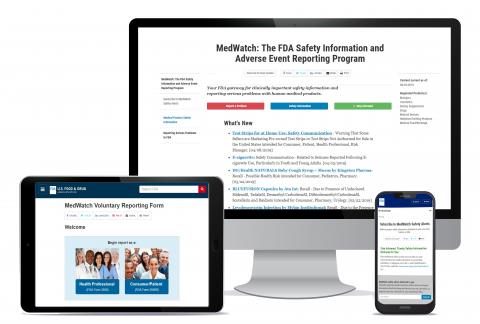Information About Reporting Adverse Events to FDAs MedWatch Program
An important FDA program called "MedWatch" allows health care professionals and consumers to report serious problems that they believe may be associated with the medical products they prescribe, dispense, or use. These reports, along with follow-up investigations, can help to identify important safety concerns.
Take the case where over 100,000 vials of the long-acting insulin Levemir were stolen and may not have been stored or handled properly. That could have made it dangerous for patients to use. After learning about a diabetic patient who suffered a serious side effect from poor blood glucose control, FDA and thedrug's manufacturer were able to determine that the stolen Levemir was being sold, and to warn the public not to use it.
Even one report can make a difference. For example, a family member of an MS patient sent FDA a report about the patient suffering heart failure after beingtreated with a relatively low dose of Novantrone. This led FDA to further investigate the potential for cardiotoxicity from lower doses of Novantrone, and that resulted in updated recommendations for closer monitoring of cardiac function in patients being treated with the drug.
Reporting can also help detect problems with medical products other than drugs. For example, FDA received several reports stating that a company's drug-eluting coronary stents had been implanted in patients who were supposed to receive that company's bare metal stents, and vice-versa. The two stents shared part of a trade name - Liberte - and that contributed to the potential for confusion. FDA then worked with the company, which changed the name of the bare metal stent from Liberte to VeriFLEX in order to better distinguish the two products.
Of course, MedWatch reports alone rarely confirm a causal relationship between an adverse event and a medical product. It may take a formal epidemiologic study or a controlled clinical trial to do that. Still, MedWatch reports are vital in helping to make sure that medical products are safe, because they provide a rapid signal to FDA that problems may be occurring.
It is important to keep the MedWatch system working, and FDA cannot do that without your help. Here are the kinds of reports we need from you:
- Serious adverse event that might be associated with a drug, biologic, medical device, dietary supplement or cosmetic product. We're particularly interested in serious adverse events that are not listed in the product labeling. "Serious" means fatalities, hospitalizations, and medically significant events.
- Therapeutic failures --- cases where the drug or device failed to work as it should (e.g., if a patient has to switch from one brand of a drug to another because the original one was ineffective).
- Use errors with medications or devices. That includes situations where the error may have been due to poor communication, or to ambiguities in product names, directions for use, or packaging.
- Product quality issues, such as suspected counterfeit products, defective components, potential contamination, device malfunctions and poor packaging.
Report these problems to MedWatch even if you are not sure that the product was the cause. You can find information about how to report at the "Additional Information" link below.


